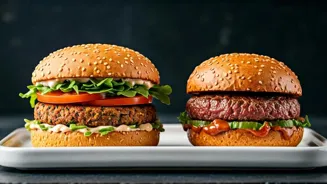Dietary Dilemma
The discussion begins by highlighting the common belief that plant-based diets are inherently healthier and lead to weight loss. However, this article
challenges this notion by comparing processed plant-based foods and meat, both of which are commonly consumed in modern diets. It aims to determine which of these dietary choices might actually contribute to weight gain. This comparison forms the foundation for a deeper exploration of the specific factors within each food type that could impact body weight.
Processed Foods
The article likely analyzes processed plant-based foods in detail, scrutinizing their ingredients and processing methods. These foods, often marketed as healthy alternatives, may contain high levels of added sugars, unhealthy fats, and sodium to enhance flavor and shelf life. These additives can contribute to weight gain by increasing calorie intake and disrupting metabolic processes. Moreover, the article could address how these processed foods lack the fiber and essential nutrients found in whole, unprocessed plant foods, potentially leading to overeating and nutritional imbalances.
Meat Consumption
The content moves on to discuss meat consumption and its impact on weight. It may examine the different types of meat, such as red meat, processed meats, and lean protein sources, and their respective effects on the body. The article could delve into the saturated fat content, which is often higher in certain meats and can contribute to weight gain and other health concerns. Portion sizes, cooking methods (e.g., frying), and accompanying side dishes are presented as crucial factors influencing weight. The article could also contrast the nutritional benefits of lean protein sources, such as promoting satiety and muscle mass.
The Weight Gain
This section likely offers an in-depth comparison, weighing the pros and cons of each food group regarding weight management. It could present scientific studies or research findings that compare the weight gain effects of processed plant-based foods and meat. Factors considered might include the impact on metabolism, the influence on appetite regulation, and the effect on overall calorie consumption. The article might highlight how both food categories can be detrimental if consumed excessively or if they contain unhealthy additives. It will then move on to unveil a "loophole" or a key factor in the diet that is related to weight gain, which readers need to know.
The 'Loophole' Unveiled
The article likely exposes a key element related to weight gain, which could be an ingredient or a combination of ingredients, or the frequency of eating certain food, that often goes unnoticed. This "loophole" could be added sugars in processed plant-based foods or unhealthy fats in meat. The content also specifies the amount that would lead to weight gain and it explores how this element is not always obvious in food labels, thus readers can unconsciously consume more of this element, resulting in weight gain. It might include actionable advice and tips, helping readers make smarter dietary decisions and manage their weight effectively.
Making Informed Choices
The article offers practical guidance for making healthier food choices. It may provide tips on reading food labels, identifying hidden sugars and unhealthy fats, and choosing whole, unprocessed foods whenever possible. It would also likely promote strategies for mindful eating, portion control, and balancing macronutrients for optimal weight management. The article could offer practical advice on meal planning, healthy cooking methods, and incorporating a variety of nutrient-rich foods from both plant-based and animal sources. These choices empower readers to take control of their diet and achieve their weight goals while maintaining overall health.














